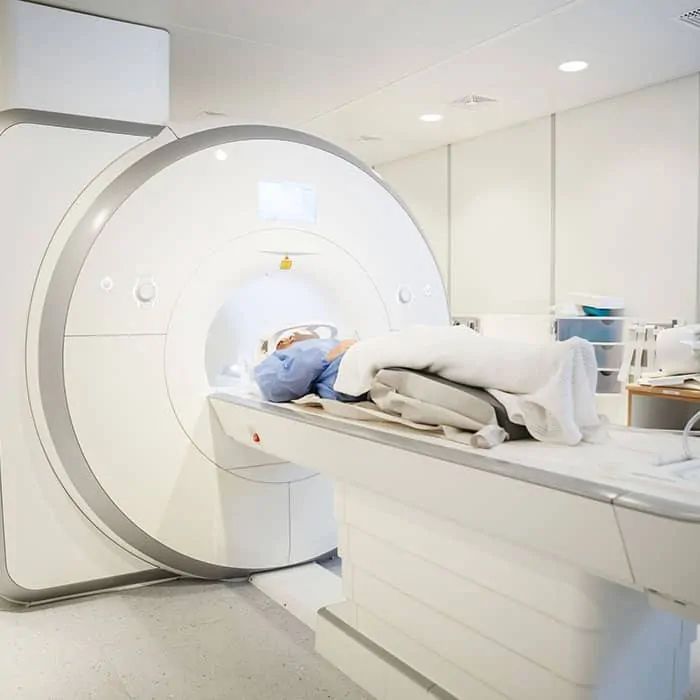Prostate MRI examination
During the prostate MRI examination, due to the high soft tissue contrast, it is possible to have a detailed overview of the histological units of the prostate.
MRI is an imaging diagnostic procedure that uses magnetic field to take detailed images of the human body.
The magnetic field generated by the device converts the energy changes in the body into a high-resolution, three-dimensional image by a high-performance computer.

What types of diseases does the examination help diagnose?
Prostate MRI is used to diagnose clinically symptomatic prostate tumours in case of elevated PSA level, along with ultrasound, and/or CT. With the help of the recordings, it is possible to determine the location of the lesion within the prostate, to detect tumour nests, to assess the risk and to estimate the risk of recurrence after therapy. They also help prepare for a biopsy, radiation therapy, or possible surgery.
Prostate MRI examination alone is not suitable for screening for prostate cancer.
In case of which symptoms is it recommended to have the examination performed?
As the examination is not suitable for screening, it is recommended to visit a urological clinic first in case of symptoms suggestive of prostate cancer, and if prostate cancer has occurred in the family. The physician, knowing the medical history and symptoms, will recommend appropriate examinations to find out the cause of the complaints.
The following complaints may indicate abnormalities in the prostate:
- Frequent urination, urinary retention
- Blood urination
- Urethral bleeding
- Bloody semen
How to prepare for the examination?
It is recommended to consult a urologist prior to a prostate MRI scan.
It is recommended to arrive with a half-full bladder for the examination.

Native scan does not require special preparation. However, it is important to know that due to the strong magnetic field, it is forbidden to bring any metal, device or object containing metal into the examination room! This also applies to implants in the body, as well as to jewellery and piercings.
Medical referral is always required for examination with contrast agent. Do not eat for 6 hours before the examination.
The condition for the administration of the contrast agent is the appropriate kidney function value (creatinine and urea). This requires a recent laboratory finding, but it is also possible to perform a rapid creatinine test or eGFR measurement on site, which is done from a fingertip and a punctured blood sample, with the help of an MRI operator.

How is the examination performed?
Prostate MRI is performed in a supine position.
The operator will place the required coils and then the examination bed will lift you into the magnetic tube.
It is important that you remain still during certain parts of the scan, you can only change your position with the permission of the operator. During the examination, you can communicate with our colleague continuously via the built-in microphone and speaker, or you can interrupt it by pressing the panic button.
The MRI device is noisy, a knocking, clicking machine noise can be heard during the examination, the intensity of which can be reduced by using earplugs.
The test lasts for 50 minutes.
Prostate MRI examination is performed by a multiparametric method, the images are taken from 3 directions, and in case of scan with contrast agent, images are taken every 20-30 seconds after the administration of the contrast agent, thus the dynamics of the accumulation of different tissues can be observed.
When can the examination not be performed?
The examination cannot be performed if you do not have an MRI compatible metal, implant, prosthesis (pacemaker), orthopaedic metal (screw, plate, nail, wire), implanted joint prosthesis, prosthetic limb, implanted defibrillator, neurostimulator, implanted drug dispenser, vascular implants (e.g. clips, vascular occlusion devices), ear implants, metal foreign body (e.g. bullet, splinter, other electronic implants).
Therefore, in case of an implant, implanted metal, prosthesis, please bring a written certificate of its compatibility with MRI examination (certified by the implanting specialist, institution) for the examination itself, which clearly states: the suitability to enter the MRI examination room, to perform the MRI examination and marking the maximum magnetic field strength (1.5 Tesla, 3 Tesla) for the device or implant. Inform the person performing the examination about the implant beforehand.
In case of an examination with contrast agent, the scan is not performed with poor kidney function.
The examination cannot be performed in the first trimester of pregnancy.
The scan cannot be performed if the subject weighs more than 200 kilograms, but it also depends on the circumference of the abdomen
What to expect after the examination?
Prostate MRI examination has no side effects.
The contrast agent used for MRI examinations is gadolinium-based. In rare cases, hypersensitivity might happen, which may occur in the form of an allergic reaction within 20 minutes after the administration of the contrast agent.
When is the result expected?
The completed recording will be reviewed by the radiologist and the result will be available in our online system after 5 working days.
In all cases, consult the urologist who ordered the examination to make a diagnosis and determine the appropriate treatment.
